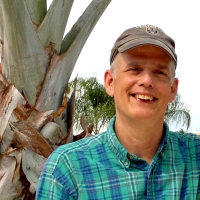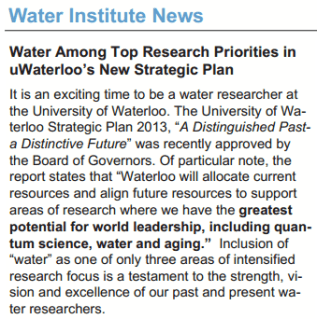George Freeman, FAUW Past President
Since I am on both Senate and Board of Governors and have been involved in discussions of Ontario university politics for five years, I do support the strategic plan in its present form and suggest another approach for Senate and individuals who don’t like the wording of the ‘over the next five years’ paragraph in the ‘transformational research’ section of the plan.
 |
| George Freeman |
My understanding of history would be that top-down direction of research (not development) has ultimately failed every time it has been tried (excluding some serendipitous fall-out which can come from any research activity). Having not seen much inclination from Waterloo administration to make that mistake, I wouldn’t worry that the strategic plan is a surreptitious move in that direction. I have been around Waterloo for a long time. I was at one of the first meetings, perhaps fifteen years ago, of the thing which ultimately became the nanotechnology piece of what is called quantum science in the plan. I participated in research discussions with the Research Institute on Aging back in 2006. I feel like water research has been amorphously congealing at Waterloo since my time as an undergraduate student in the 1970s (perhaps deriving from the puddles of 1957). My point is that these research areas became strengths from the ground up – because of Waterloo faculty interests and abilities and pursuits. It would be a fool’s game to strategically move into a research area without significant prior faculty buy-in and engagement and expertise. Thus, I would say the ‘transformational research’ section of the strategic plan, where it mentions specific research, is highlighting and celebrating a few current strengths from the thousands of research agendas we follow. In a time frame as short as five years, significant resources already have been, or are being, directed to those areas, plan or no plan. Everything else in that section is about supporting research generally and came from consultations with all stakeholders at a scale I would say has never before been seen on this campus. Fifteen years from now, I believe the highlighted research will look quite different.
My understanding of publicity would be that the plan is out there, has made its primary impact, and is now yesterday’s news as far as the public is concerned. If Senate wants to change the word ‘including’ to ‘including, but not limited to’ or some longer version of that – or to delete the paragraph – the only public news is the conflict between our Senate and our Board. That kind of exposure will not help us as faculty in anything we wish to accomplish and I would go so far as to call it a conflict based more on circumstances than overt actions.
Nothing is perfect. Waterloo is a big complex place in an environment of constant change trying to preserve proven academic principles which are under vicious attack in the public sphere. Meetings of Board and of Senate are costly, important events and people have other lives, especially in the summer. An administrative upheaval occurred, during the plan preparation, with the resignation of Sallie Keller, our previous Vice-President, Academic and Provost (VPAP). I believe Geoff McBoyle, our present VPAP, even put Waterloo ahead of his own well being (through lack of sleep) getting the plan out in time. If you want to understand the urgency, and the political risk, subscribe to the OCUFA news feed or spend some time reading the HEQCO website. If you have a particularly strong stomach, check out the Ontario government’s Productivity and Innovation Fund to which the university had to respond in September. The attacks and misunderstandings seem to come daily, some well planned and well funded, and some seeking essentially to dismantle the structures which make universities work to the benefit of society and change them to the benefit of other interests. I don’t think we have much political space for generic arguments. Had it been noticed in time, I’m convinced that the paragraph which bothers people would have been altered without a second thought by the Board or administration. The political goal, I think, is to look tremendously successful in things to which the public can easily relate and project our confidence that this will only get better in the future, ensuring their prosperity. Our story has to be as simple and immediately absorbable as the almost-completely-false but intuitively comfortable stories of some of the influential people attacking us.
Anything said in the document can, of course, be picked up by someone with an intent to push their own interests over yours. This happens sometimes with the faculty-level strategic plan in my faculty, for example. That’s where our full participation as faculty members in collegial governance comes in. FAUW has worked with the administration to become a permanent part of the Senate Long-range Planning Committee. Keeping that committee active is a good place to be involved in actual strategy.
“Get involved with FAUW activities. If someone in the public misinterprets the plan, set them straight or direct them to someone who can.”
Speak up in your department, faculty, or university committees. Regardless of what any plan says, most resultant actions need approvals before they can happen. Get involved with FAUW activities. If someone in the public misinterprets the plan, set them straight or direct them to someone who can. Most of what happens at Waterloo passes through public meetings in open session (or should). You could have attended, for example, every significant discussion of the strategic plan by the Board and heard first hand what each governor said (nothing about specific research directions in my recollection). My advice for Senate on the plan would be that we come to a understanding (recorded in the minutes) with the administration about the meaning of the one controversial paragraph. As a senator, I can be rightly upset about how the plan traversed its Senate approvals, but at some point I believe I have to look for the best solution in the context of what actually happened rather than a worst-case interpretation or an idealistic stance for its own sake.
As a public document, I believe the plan serves us well in this time and place. It makes us unique to the point of being anomalous in Ontario (on yet another front for Waterloo). As an internal document, it captures what people said they wanted, plus or minus. Internally, I consider the planning process much more important than the resultant plan. How about externally? What I believe we want to do, ideally, is load up our external Board members and other supporters with enough ammunition on Waterloo’s beliefs, and accomplishments under those beliefs, that they can sell our case in the corridors of power and money where they operate. If they are successful, this aids the case that Waterloo is a worthwhile investment and that it is not a target needing political meddling. When we go asking for support, it won’t matter so much that
they remember how successful we are in water, quantum science, or aging – it will only matter that they remember we are successful on a certain scale. I believe this is the ‘branding’ for Waterloo which people are seeking. It’s hard to make such an impact on outsiders without specific good examples.
The Senate needs to worry mostly about academic credibility, academic planning, and the motivations of faculty and students.
As always, I think the Board and Senate are voting on somewhat different things. The Board needs to worry mostly about risks of various kinds and about garnering support for the university. This is a high-level oversight role, not day-to-day management. The Senate needs to worry mostly about academic credibility, academic planning, and the motivations of faculty and students. When a big resource movement is contemplated, these worlds mix a bit but mostly they seem to move along somewhat separately at the university level (unless you are a president or other high-level administrator). Where you really want a sharp eye out, I think, is your department and faculty and how the plan is interpreted into specific actions.
There’s also a bit of talking past each other going on between the Board of Governors and the Senate, I believe. When the Board talks about a strategic focus on three areas, it is talking about the first three sections of the plan, namely ‘experiential education for all,’ ‘a uniquely entrepreneurial university,’ and ‘transformational research.’ These are the areas where Waterloo stands out on the Ontario and international stages. The other five are in great shape at Waterloo but don’t represent as much of a competitive advantage in promoting this university. The government is serious about universities needing to understand and promote their strengths (differentiation), although we don’t know as yet exactly how that translates into funding decisions. Nevertheless, I think it is prudent for Waterloo to be in the game and ready.
I just got back from a meeting of Ontario members of boards of governors of universities, on the topic of what universities will look like in ten years, at which we heard from the Governor General of Canada, the Ministry of Training, Colleges, and Universities (both the Minister and Deputy Minister, separately), and several speakers and panels comprised of people experienced as university presidents, university board chairs, employers of university graduates, students, and education trend watchers or reporters. I would call it the most intense discussion of Ontario universities that I have ever participated in outside of a conflict environment. Based on my understanding of what was said, what is misunderstood, and what needs to be done, Waterloo’s strategic plan positions us extremely well (in fact, all three of Waterloo’s targeted areas, namely experiential education, entrepreneurial focus, and truly transformational research, were specifically mentioned as urgent priorities by many participants). There are real changes afoot and Waterloo looks well placed to be agile.
Bottom line is that I support the plan and urge Senate to take a non-confrontational route to reaching an understanding of its meaning.




